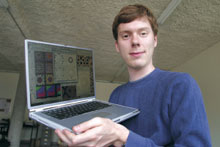
Eric Hortop: Chronic indecision paid off

Photo by Andrew Dobrowolskyj
Chronic indecision has been a blessing for Eric Hortop. Unable to decide whether to pursue a degree in arts or science, he opted to do both by doing a major in the Communication Studies and Mathematics. It uniquely suited him for an interdisciplinary Concordia research project.
Since 2002, Hortop has been working on and off as a co-op student and key member of Concordia’s Virtual Studio Project, helping to develop a program known as the Shape Grammar Inference System.
This program, which is still in development, will eventually be able to break down geometric patterns into a set of rules — a grammar of shapes — which can then be used to replicate patterns and compare them to others.
With it, archeologists could take art fragments and discover what “language” the shapes speak (early Christian Celtic? post-Peloponnesian War Greek?), anthropologists could study the differences and overlaps between the shape grammars of various areas and eras, and artists could create new works.
Hortop has had a wide-ranging role in the project, from helping develop the theory to influencing the technical and programming side to being one of the project’s principal spokespeople at conferences.
Much of his initial training came from two co-op (alternating work-study) terms spent working at Statscan, where he helped program an algorithm to subdivide Canada into parcels small enough for surveyors to comprehensively examine, yet which were not bisected by any major obstacle like a highway or a river.
When not in the lab, Hortop works on his own website, develops Flash animations, and uses screen printing, etching, and photography as creative outlets. He has had some of his artistic work integrated into FCMM, Montreal’s new media festival, and Concordia’s print media show.
He has applied to Concordia to do his master’s in mathematics, where he would focus his thesis on some aspect of the Shape Grammar Inference System project, but does not yet have further plans.
However, whether his career takes him to StatsCan, the National Research Council, or a professorship, he knows that he will be doing technical problem solving using mathematics on projects that are “interesting, challenging, wide-open and weird.”